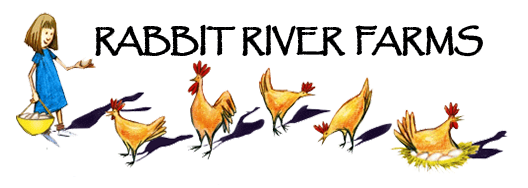Free Run? Free Range? Organic? What’s the difference?
 Local reporter Erin Shaw produced the following video segment on the different kinds of eggs that are available to consumers. The video does an excellent job of actually showing the difference between the living conditions diet and housing for hens on Caged, Free Run, Free Range and Organic Farms.
Local reporter Erin Shaw produced the following video segment on the different kinds of eggs that are available to consumers. The video does an excellent job of actually showing the difference between the living conditions diet and housing for hens on Caged, Free Run, Free Range and Organic Farms.
Rabbit River Farms is featured as the Organic Farm.
How Exactly do Chickens Lay Eggs?
Believe it or not, the egg laying process for a chicken begins in its eye. Chickens lay eggs only after receiving a light cue, either from natural sunlight entering a coop or artificial light illuminating a commercial egg barn. The light stimulates a photo-receptive gland near the chicken’s eye, which in turn triggers the release of an egg cell from the chicken’s ovary.
Most chickens lay eggs on an almost daily basis, unlike some other egg-laying animals which only release an egg every thirty days or so. The chicken also releases a small disk of material which surrounds the egg cell and provides nutrition. The chicken’s uterus also fills up with albumen, the viscous substance we know better as egg white.
Meanwhile, a membrane forms around the inside uterine wall, which seals in the egg cell, yolk and albumen. Eventually a mixture of water, salt and calcium surround this membrane and form a thin but structurally sturdy outer shell. This shell is molded in the shape of the uterine wall, thus giving a chicken’s egg its distinctive shape. While in the uterus, the egg’s narrower end points downward, but it will later turn and be ejected wider end first.
Once the egg has fully formed, the chicken’s uterus begins to contract in an effort to expel it. The egg moves down a vaginal canal towards an external opening known as a vent. The vent is a common opening for both egg laying and waste elimination, but a chicken cannot perform both functions at the same time. An internal flap known as a cloaca keeps the vaginal canal and the intestinal track separate until either an egg or excrement reach the vent. When a chicken is laying an egg, the cloaca descends and blocks the intestinal track.
Once the egg passes the cloaca, it is carefully expelled through a series of muscular contractions which essentially turn the vaginal canal and cloaca inside out at one point. Eventually the egg is pushed out through the vent and ideally lands intact on the ground. Many chickens let out an audible cluck at this point, but designated egg layers rarely display any other maternal concern. Chickens lay eggs every 24 to 36 hours at the height of their productive years, so individual eggs rarely attract their attention.
Once a chicken lays a certain number of eggs, it may stop producing more eggs and go into a “brooding” stage, a maternal stage in which the mother will sit on her eggs until they hatch. In order to prevent egg layers from brooding, freshly laid eggs must be removed on a daily basis. Chickens lay eggs as long as they believe they need more to form a proper brood. The egg laying process continues whether or not a rooster provides enough sperm for fertilization. A chicken cannot tell if an individual egg has been successfully fertilized or not.
Article Details:
Written By: Michael Pollick
Edited By: Bronwyn Harris
Last Modified Date: 09 October 2012
Copyright Protected: 2003-2012 Conjecture Corporation
Vancouver Humane Society Thank You
A nice card received from our friends at the Vancouver Humane Society…

Michael Pollan Interview
Here is an interesting interview with the author of “Food Rules”.
Compost Dairies Visits Rabbit River Farms
This article is reproduced from the May 2010 blog post by Spring Gillard on the Compost Diaries: The Conversation Continues website. It first appeared in the spring issue of BC Organic Grower Magazine.
As a child, Steve Easterbrook and a friend paid regular visits to a neighbour up the street in rural Burnaby; the sometimes grumpy old man had an aviary. In spite of being a grump, he let the kids hang around and showed them the ropes. He raised traditional heritage breeds like Rhode Island Reds and Black Jersey Giants.
 It was before battery houses came into vogue in the late 1960′s, free range was still in existence,” said Easterbrook..
It was before battery houses came into vogue in the late 1960′s, free range was still in existence,” said Easterbrook..
Those visits sparked his lifelong passion for poultry and deep interest in the avian world. At only eight years old, Easterbrook and his friend were tending their own flock of free range chickens, providing eggs for their families and neighbours.
Thirty years later, Easterbrook bought eight acres of farm land in Richmond on the Fraser River. After some market research, he discovered that no one was selling certified organic eggs anywhere in Canada. He approached the British Columbia Association for Regenerative Agriculture (BCARA) to suggest that they work together to establish some regulatory standards. They gave him some California standards to guide him in the meantime. He built a barn, purchased a small flock of poultry and was off and running. Well sort of. He hit a pretty big glitch when he contacted the BC Egg Marketing Board (BCEMB) and learned about the quota system.
And so ensued a long and drawn out struggle to help establish the organic egg industry. Other organic egg producers were involved over the years and each played a significant role in the development of the industry. The markets have changed a lot since the inception of the boards, especially with the rise of organics, but the marketing schemes have not. It would have cost Easterbrook about $70 a bird to buy quota.
In 1994, Easterbrook opened up outside of the system initially with 300 hens and sold his organic eggs to Circling Dawn, an early “health food” store in Vancouver. The customers loved the eggs. After some tweaking of the organic feed with supplier (and another organic pioneer), Rod Reid, production was ramped up and he was off to the races. Well sort of. Then two BCEMB inspectors showed up on his farm and started counting birds.
 The woman said, “I’ve never seen birds outside before, it’s so beautiful and uplifting.”
The woman said, “I’ve never seen birds outside before, it’s so beautiful and uplifting.”
The man said, “You have to have quota or we’ll shut you down”.
A few days later Easterbrook received a letter informing him he was operating illegally. They also stapled a seizure notice on his barn. He never saw it though, because the chickens ate it. Only staples and bits of paper remained. The inspectors had posted the notice within beak reach.
“They obviously had no idea how free range chickens behave,” he said.
He couldn’t afford a lawyer, but with the help of a law librarian, he managed to file an appeal. He also launched a customer campaign that resulted in a flood of faxes and a petition sent to the BCEMB and the Ministry of Agriculture.
Easterbrook took an educational approach during his appeal. He delivered a presentation on the health and environmental benefits of organic eggs. He encouraged them to see this as a market opportunity.
“Trying to shut organics down was contrary to their purpose as an egg marketing board,” he said.
They agreed not to shut him down, if he agreed not to expand. But ultimately, he had to bite the bullet and buy the quota. He considered it a necessary evil. The industry continued to struggle and there were on-going legal battles. Easterbrook just kept his head down and worked quietly behind the scenes, lobbying for a new entrant status and program.
The day I phoned him, he was celebrating. He had just heard that the BCEMB was finally implementing a program; four new organic egg producers with 3,000 birds a piece would be grandfathered in to the system each year in a lottery.
Today, Rabbit River Farms is certified by the Fraser Valley Organic Producers Association (FVOPA). A staff of eight tend to five thousand layer hens, producing 4700 eggs a day that are then sold in stores throughout BC. Chickens range in a lovely organic pasture and dine on certified organic vegetarian feed.
“Livestock are free to maintain their normal social order. They can move, interact, dust, scratch, peck,” he said. He calls it “freedom farming”.
 Easterbrook’s new state of the art “translucent” barn is in full operation now too. It has an egg grading station and a three level open nesting system with manure belt. Birds can walk around, roost, perch, water and feed comfortably in a naturally, daylighted environment. An Earth Bin composts the chicken manure.
Easterbrook’s new state of the art “translucent” barn is in full operation now too. It has an egg grading station and a three level open nesting system with manure belt. Birds can walk around, roost, perch, water and feed comfortably in a naturally, daylighted environment. An Earth Bin composts the chicken manure.
Easterbrook has applied for farm gate status and hopes to soon be selling eggs, heritage poultry breeds, and a chicken manure based fertilizer and soil mix on site. The organic egg business is hopping along nicely now. And so to the catchy name.
“It’s a play on my last name,” says Easterbrook. And the farm is on, well, not a brook, but a rather mighty river.
A Liaison with Layers

For a week in July 2012 my sister and I, two veterinary students from the Royal (Dick) School of Veterinary Medicine in Edinburgh, visited Rabbit River Farms to learn about the egg laying industry and experience life on the farm. We were excited to see the very first organic egg farm in Canada and gain insight on poultry welfare.
Upon arrival, we were greeted by the farmer’s wife who introduced us to the nutritionist on site and the workers. The owner, Steve Easterbrook, valued his workers highly and provided them with great working conditions. The workers were always very happy and always presented us with smiles and hellos in the morning. One of the first things we noticed after setting foot in the grading plant was how clean everything was. The workers work very hard to ensure maximum sanitation. Rounding the corner, we noticed something that not every barn has: a viewing area for visitors. We have been to several farms over the years and many farmers have stressed the conflict of wanting to educate the general public on their practices and biosecurity. Steve has a great setup to prevent biosecurity issues but also to show visitors the ins and outs of organic poultry farming.
 One of the main problems with free range layers are the eagles who love to eat the chickens. One of our duties was to chase away eagles if we ever saw one. It was interesting to hear how important crows were to the farm as their presence deterred eagles from entering the area. The farm was in the process of putting up wire lines 10 feet above the free range yard to prevent eagle attacks, as eagles need a lot of space to take off. When eagles analyze a food source they not only see how easy it will be to get the prey but also how easy it is to leave the area. With these wires, it would be very hard to leave the free range area after landing and thus these wires would deter eagles.
One of the main problems with free range layers are the eagles who love to eat the chickens. One of our duties was to chase away eagles if we ever saw one. It was interesting to hear how important crows were to the farm as their presence deterred eagles from entering the area. The farm was in the process of putting up wire lines 10 feet above the free range yard to prevent eagle attacks, as eagles need a lot of space to take off. When eagles analyze a food source they not only see how easy it will be to get the prey but also how easy it is to leave the area. With these wires, it would be very hard to leave the free range area after landing and thus these wires would deter eagles.
 To ‘earn our stripes,’ as Steve says, we performed many farm duties such as cutting blackberry bushes, weed trimming, cutting greenery, shovelling manure and putting up fences. You really appreciate the value of a dollar when you work on a farm! Even though it was hard work, we had the privilege of working with the main barn hand, Harjinder. She had immigrated from India just six years ago and was the hardest worker we had ever seen! She also loved her chickens! After working at the poultry barn she would rush right back home to milk 200 cows!
To ‘earn our stripes,’ as Steve says, we performed many farm duties such as cutting blackberry bushes, weed trimming, cutting greenery, shovelling manure and putting up fences. You really appreciate the value of a dollar when you work on a farm! Even though it was hard work, we had the privilege of working with the main barn hand, Harjinder. She had immigrated from India just six years ago and was the hardest worker we had ever seen! She also loved her chickens! After working at the poultry barn she would rush right back home to milk 200 cows!
Aside from our outdoor duties, we also helped Harjinder with barn duties. Our favourite part was in the morning when we walked through the barn collecting eggs; it was one big Easter egg hunt! Any child (or adult!) would have loved it. The feed was provided four times daily automatically, but we gave oyster shells (for extra calcium!) every day. Water was provided via water nipples. At 11:30 am every day, weather permitting, the barn doors were opened and birds were free to wander the vast landscape outside the barn. We spent a lot of time outside socializing with the chickens. It was great to see the animals exhibiting natural behaviour and socializing outside of the barn walls. We quite enjoyed sitting with the birds while they explored the outside grasslands. The poultry were let back in at dusk.
 Raj, Harjinder’s husband and the onsite nutritionist, was very knowledgeable about the farming industry. He gave us several lectures on poultry nutrition and welfare. It was very interesting to learn about feather pecking and the different methods to control it. It was interesting to learn about the different causes and the different ways of controlling feather pecking in a free range laying system. Raj also gave us a lecture on nutrition; one of the most interesting facts was how quickly chickens respond to a change in feed. If something is wrong with the feed, the farmer sees the detriment within 72 hours. It is therefore very important for the industry to maintain high feed and nutrition standards. Most other animals would not show detriments for quite some time.
Raj, Harjinder’s husband and the onsite nutritionist, was very knowledgeable about the farming industry. He gave us several lectures on poultry nutrition and welfare. It was very interesting to learn about feather pecking and the different methods to control it. It was interesting to learn about the different causes and the different ways of controlling feather pecking in a free range laying system. Raj also gave us a lecture on nutrition; one of the most interesting facts was how quickly chickens respond to a change in feed. If something is wrong with the feed, the farmer sees the detriment within 72 hours. It is therefore very important for the industry to maintain high feed and nutrition standards. Most other animals would not show detriments for quite some time.
We thoroughly enjoyed our experience at Rabbit River Farms. It was nice to get a tour of their old barn with Steve’s mother in law, Janet, and see how much Steve and his wife have expanded the business. I was surprised to hear that they had only been in operation at the new plant for three years! It was a great success story. As my father always says, find something you love to do and find something that people want. By making his hobby his business and starting up the first organic laying farm in Canada, Steve has done just that!
White Free Range Eggs Break with Tradition
Vancouver Sun news article published on July 14, 2012. A number of mistakes made in the article have been noted with the corrected information.

A B.C. egg farmer is producing Canada’s only white-shelled specialty eggs, a free-range, humanely raised Omega-3.
By convention in Canada, cage-free eggs – free run, free range, organic and designer eggs such as omega-3 – have brown shells, usually laid by a hybrid of the Rhode Island Red, a large, hardy breed. White-shelled eggs, called conventional or table white, are mainly laid by a smaller, slighter hybrid of White Leghorn, which are
bred for life in battery cages.
But Richmond egg farmer Stephen Easterbrook is turning the tables on the table white egg. Rabbit River Farms Omega-3 white eggs are coming to market this month at a retail price that will range upwards of $5.50 a dozen, depending on the store. Rabbit River Omega-3s can be purchased in cartons of all-white eggs or a random mix of white and brown.
Easterbrook has created a brand of designer white egg, laid by a cousin of the White Leghorn called a Lohmann, to answer a frequent esthetic complaint consumers have about brown eggs: the so-called “meat spot.”
Many eggs have a tiny piece of ovarian membrane near the yolk, which in brown eggs may absorb pigment left over from the previous egg’s shell.
“Both white and brown eggs have the tissue, but in white eggs you can’t really see it because it’s white,” said Easterbrook.
Easterbrook tested the notion of free-range Lohmanns on mini-flocks before launching his mixed white and brown commercial flock of 6,000 hens.
Life for Rabbit River Free Range Omega-3 Lohmanns is a considerable improvement over life in a cage.
The birds are free range, meaning that weather permitting, they have on average eight hours a day of access to the outdoors, an area that totals six acres. Canada’s federal organic standard also stipulates that the hens are free to range, nest, roost, dust bathe and socialize.
The hens are fed non-GMO, antibiotic free, all vegetarian grains & legumes, plus ground flax seed and vitamin E to enhance the omega-3 fatty acid and antioxidant content of the eggs they lay.
The flock is also certified humane by the B.C. Society for the Prevention of Cruelty to Animals.
Rabbit River also produces free-run omega-3 eggs, which are cage-free and barn- raised without outdoor access. Because the hens require less management and training, the eggs are a few cents cheaper.
© The Vancouver Sun
BCSPCA FarmSense Newsletter

The BC SPCA publishes a bi-monthly newsletter, FarmSense, that focuses on news “about farm animal welfare issues, research results, and information on the BC SPCA’s activities that help farm animals in BC”.
Their April 2012 newsletter focus is on the life of egg-laying hens:
The Future of Confinement Housing for Egg-Laying Hens
n Canada, more than 26 million hens are raised for egg production each year, and more than 90% of them spend their lives in small, barren battery cages. While these cages allow for efficient and hygienic egg production, there is strong scientific evidence proving they negatively affect bird welfare. As a result, legislation and consumer demand have prompted changes to the way egg-laying hens are raised. This leaves many people wondering what commercial egg production will look like in the future, particularly with the development of a new Canadian Code of Practice for egg-laying hens in the works. Can we implement systems that meet societal expectations to provide hens with a high level of welfare, and at the same time, maintain production efficiency?
Canada-Wide Discussions About Battery Cages for Laying Hens
In May 2011, the Animal Welfare Foundation of Canada hosted four regional meetings focused on determining whether there is a future for laying hen battery cage housing in Canada. Other countries around the world have banned battery cage systems, and so the meeting discussions were intended to help gather opinions on whether the same should occur in Canada.
Egg farmer hatches Ethics in Action award
“There’s going to be party in the hen house tonight,” exclaimed Stephen Easterbrook of Rabbit River Farms as he accepted the Ethics in Action Award back in 2001. Rabbit River – whose name originates from Stephen’s name Easter (Rabbit) and brook (River) – is an impressive example of combining socially responsible ethics in a sustainable business environment. Established in 1994, Rabbit River was the first certified organic free-range egg farm in Canada. Founder and owner Easterbrook is responsible for developing organic free-range husbandry techniques; he even co-wrote the organic poultry farming certification standards that are now used by all BC egg farmers.
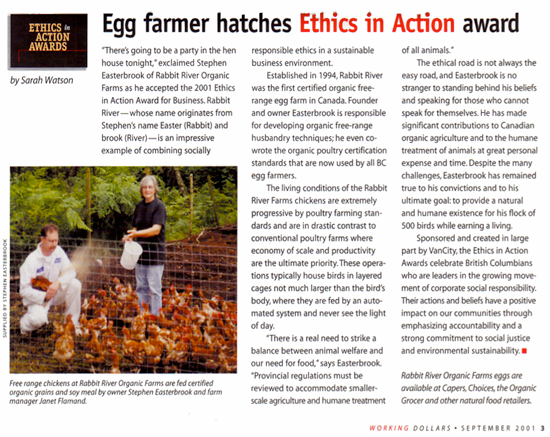
The living conditions of the Rabbit River Farms chickens are extremely progressive by poultry farming standards and are in drastic contrast to conventional poultry farms where economy of scales and productivity are the ultimate priority. These operations typically house birds in layered cages not much larger than the bird’s body, where they are fed by an automated system and never see the light of day.
“There is a real need to strike a balance between animal welfare and our need for food,” says Easterbrook. “Provisional regulations must be reviewed to accommodate smaller-scale agriculture and humane treatment of all animals.” The ethical road is not always the easy road, and Easterbrook is no stranger to standing behind his beliefs and speaking for those who cannot speak for themselves. He has made significant contributions to Canadian organic agriculture and to the humane treatment of animals at great personal expense and time. Despite the many challenges, Easterbrook has remained true to his convictions and to his ultimate goal: to provide a natural and humane existence for his flock. Sponsored and created in large part by Vancity, the Ethics in Action Awards celebrate British Columbians who are leaders in the growing movement of corporate socially responsibility. Their actions and beliefs have a positive impact on our communities through emphasizing accountability and a strong commitment to social justice and environmental sustainability.
Lush Cosmetics Visits Rabbit River Farms
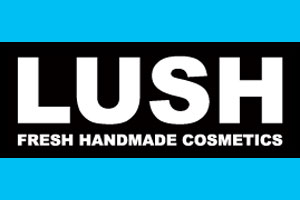 In May of 2011, the staff of LUSH Fresh Handmade Cosmetics took a tour of our farm. Lush is an international cosmetics company that has outlets in many international airports and malls. They specialize in products that are made with fresh, natural materials and they do not perform testing on animals. Lush has a local manufacturing division in South Vancouver just 6 kms away from Rabbit River Farms. They use Rabbit River’s free range eggs as an ingredient in several of their products. Below is their staff’s impression of the visit as per their company newsletter.
In May of 2011, the staff of LUSH Fresh Handmade Cosmetics took a tour of our farm. Lush is an international cosmetics company that has outlets in many international airports and malls. They specialize in products that are made with fresh, natural materials and they do not perform testing on animals. Lush has a local manufacturing division in South Vancouver just 6 kms away from Rabbit River Farms. They use Rabbit River’s free range eggs as an ingredient in several of their products. Below is their staff’s impression of the visit as per their company newsletter.
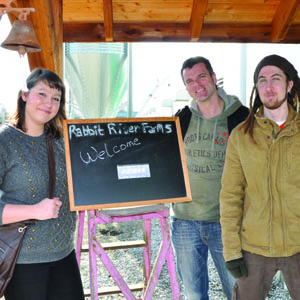 Located only 20 minutes away from our production facility, Rabbit River Farms supplies the fresh eggs we use in our Cosmetic Warrior, Sacred Truth and Brazened Honey face masks. Eggs are fantastic for the skin, as they balance the natural sebum production. We were lucky enough to get a personal tour from the owner himself, the delightful and innovative Steve Easterbrook.
Located only 20 minutes away from our production facility, Rabbit River Farms supplies the fresh eggs we use in our Cosmetic Warrior, Sacred Truth and Brazened Honey face masks. Eggs are fantastic for the skin, as they balance the natural sebum production. We were lucky enough to get a personal tour from the owner himself, the delightful and innovative Steve Easterbrook.
We arrived to spot a sign outside the front door “Welcome LUSH!” Already charmed, we peeked inside the “barn” door to see the hundreds of eggs being packaged up to be sent out to local grocery stores across BC. Steve greeted us warmly and told us how excited everyone was to have us visit. Before taking us on a tour of the entire facility, which is the only egg production site in BC that both raises hens and packages the eggs, Steve told us a bit about how his farm came to be. Rabbit River Farms was started by Easterbrook in 1993. 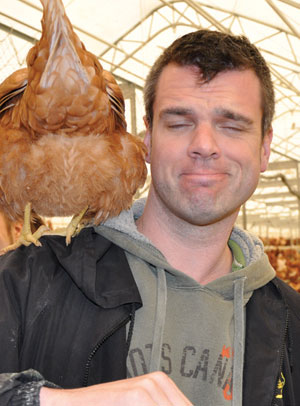 His great grandfather owned the first grain mill in Richmond, BC, and as a child, Steve had looked after free range chickens in the backyard. Steve left farming as a young man, venturing into other “boring industries”, as he put it. Eventually, he felt called back to his roots and decided to purchase a large plot of land. Unsure of what to do next, Steve visited a local organic farm and asked what the market was missing. Eggs! At the time, there were no producers of organic eggs in Canada. In fact, there weren’t even any standards in place for certifying eggs organic. Steve approached the certification board and they agreed to let him experiment, effectively writing the standards as he went along. Steve was also instrumental in developing the first ever organic animal feed.
His great grandfather owned the first grain mill in Richmond, BC, and as a child, Steve had looked after free range chickens in the backyard. Steve left farming as a young man, venturing into other “boring industries”, as he put it. Eventually, he felt called back to his roots and decided to purchase a large plot of land. Unsure of what to do next, Steve visited a local organic farm and asked what the market was missing. Eggs! At the time, there were no producers of organic eggs in Canada. In fact, there weren’t even any standards in place for certifying eggs organic. Steve approached the certification board and they agreed to let him experiment, effectively writing the standards as he went along. Steve was also instrumental in developing the first ever organic animal feed.
We love that Steve is local, but we also buy from Rabbit River Farms because their values and ethics are in line with ours here at LUSH. Steve summed it up wonderfully for the both of us; It’s about taking ownership and passion in your product.
Today, Rabbit River Farms has over 5,200 birds and packages 216,000 eggs per week including eggs from affiliated egg farmers. All of the eggs produced are certified organic, free range (hens are free to walk around outdoors) or free run (hens are kept in an open-concept house with access to the outdoors). His hens are never kept in cages, given antibiotics or any sort of genetically modified feed. Rabbit River Farms is also certified by the BCSPCA (British Columbia Society for the Prevention of Cruelty to Animals).
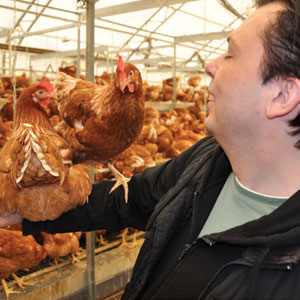 Steve was kind enough to show us the entire process, from hen to carton. He took us to the main barn, which houses approximately 5200 hens. The first thing we noticed upon walking in was how much quieter it was then we expected. You’d think a few thousand chickens would make more noise! All we encountered was the low hum of wings flapping and beaks pecking in the food troughs. The hens were moving around the barn freely, preening, feeding, and most importantly – socializing. It’s vital for chickens to establish a pecking order, so being able to socialize normally makes for a harmonious laying environment. After a few photos with our new flock of friends, we followed the conveyer belt that ran from the laying nests to the washing station. Thousands of eggs run through hot water and steam, as per food safety standards, before being carefully inspected for cracks. The eggs are then sorted by weight, packaged and handled by the lovely staff. Steve showed us all the various sizes and colours eggs could come in, calling the little spheres “nature’s perfect package”. The entire process was very complex, yet so simple at the same time.
Steve was kind enough to show us the entire process, from hen to carton. He took us to the main barn, which houses approximately 5200 hens. The first thing we noticed upon walking in was how much quieter it was then we expected. You’d think a few thousand chickens would make more noise! All we encountered was the low hum of wings flapping and beaks pecking in the food troughs. The hens were moving around the barn freely, preening, feeding, and most importantly – socializing. It’s vital for chickens to establish a pecking order, so being able to socialize normally makes for a harmonious laying environment. After a few photos with our new flock of friends, we followed the conveyer belt that ran from the laying nests to the washing station. Thousands of eggs run through hot water and steam, as per food safety standards, before being carefully inspected for cracks. The eggs are then sorted by weight, packaged and handled by the lovely staff. Steve showed us all the various sizes and colours eggs could come in, calling the little spheres “nature’s perfect package”. The entire process was very complex, yet so simple at the same time.
I was really impressed with the professionalism and pride everyone took. The chickens were treated almost like guests at a hotel, so many things revolved around maximizing their comfort and reducing stress. I liked how they all came running to get attention from the employees. The proactive approach to setting the standards high and attention to detail really sets a great example for the industry.
– Brendan Delhomeau, LUSH Manufacturing
Steve’s extensive knowledge, experience and passion for farming have revolutionized the way eggs are produced in Canada today. His commitment to the welfare of his animals is abundantly clear. We hurled questions at him for hours and he answered every one with as much enthusiasm as the first. “I love animals” Steve stated simply. He pointed out that much of what humans need is dependent on contributions from animals, so it’s important to give them respect and humane treatment. He often refers to his philosophy as “freedom farming”, meaning farms should be an environment where animals are free to engage in their natural behaviors. He’s constantly challenging himself to “do it better for the birds”.
I loved the entrepreneurism and passion of Steve. Following a dream from a light bulb moment related to organic and earth friendly ethics. The more conscious businesses become, I hope it fosters more success stories like these.
– Mike Elliot, Lush Buying Team
